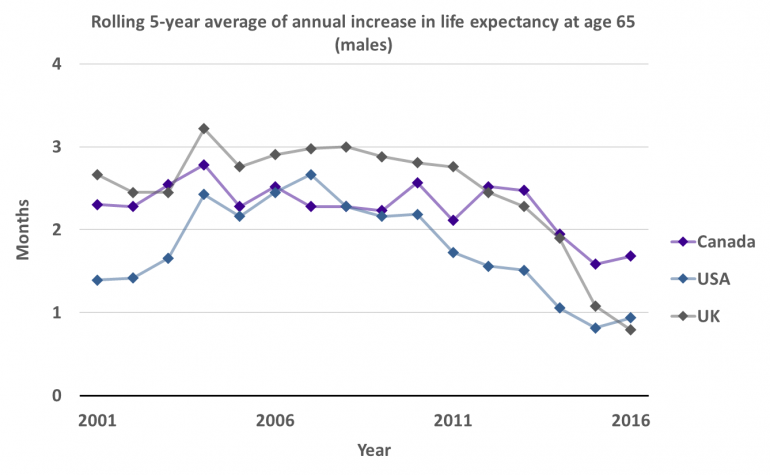In May 2019, Statistics Canada reported that “Life expectancy stops increasing in Canada”1, since, for the first time in more than forty years, Canadian life expectancy at birth (for both men and women) did not increase from 2016 to 2017. The Statistics Canada report stated that this trend change was “largely attributable to the opioid crisis”, especially “among Canadian men aged 20 to 44 years.” Despite this concerning development, life expectancy for Canadians aged 65 did continue to increase.
There has been a lot of talk in the pension industry in recent years (at least in actuarial circles) about a slowing in the rate at which longevity has been improving, particularly in the UK and US. However, unlike the Statistics Canada report, the slowing trend being discussed involves older ages (i.e., ages 60+), the age cohort that has experienced the greatest longevity improvements over recent decades. This slowing trend at older ages has also been observed in Canada but has received relatively less attention than in the UK and US – partly because of a lack of publicly available, up-to-date Canadian mortality data, which only recently became available via an update to the Human Mortality Database.
The chart below illustrates how the pace of UK, US and Canadian longevity improvements have changed over recent years, by way of the five-year average increase in life expectancy for males aged 65. From 2001 to 2011, improvements in the UK were remarkably high – life expectancy increased by nearly three months per year for a decade! Since then, average improvements have significantly slowed, and more recent data from the CMI2 shows improvements slowing even further.

Source: Human Mortality Database
The US experience over the same period shows a similar pattern, although the degree to which longevity has slowed hasn’t been as significant as in the UK, given the lower level of improvements prior to the slowing.
For Canadians, we observe a more modest slowdown over recent years, prior to which the average pace of improvements had been steadier, at almost two and a half months per year.
These results come with an important word of caution in the context of defined benefit pension plans: research by Club Vita and the PLSA in the UK3 has shown that these average improvements mask more complex trends – particularly, that lower socio-economic groups have been the most impacted by the slowing, whereas higher socio-economic groups have been relatively unaffected.
The underlying reasons for the overall slowdown in improvements are difficult to unpack. While there are different theories for individual country trends (e.g., the effects of flu and other winter risk factors in the UK), there is evidence of a global trend among developed countries. One possible explanation of a global slowing trend is that the higher rates of improvement in the 1990s and 2000s were fueled by a confluence of factors reducing mortality due to cardiovascular disease (e.g., introduction of statins and other medical interventions, and reduced prevalence of smoking) that are now having a more modest impact.
Currently, the slowing trend in improvements leads to more questions than answers. However, while longevity may recently have been improving at a slower rate, Club Vita’s research shows that Canadian life expectancy (at age 65) continues to increase.
1https://www150.statcan.gc.ca/n1/daily-quotidien/190530/dq190530d-eng.htm
2 The Continuous Mortality Investigation, an organisation owned by the Institute and Faculty of Actuaries in the UK and dedicated to mortality and morbidity analysis.
3https://www.clubvita.co.uk/assets/images/general/170623_16_PLSA-Longevity-model.pdf
Contact us
To find out more about how we can help you please don't hesitate to get in touch
Join the discussion
Our Friends of Club Vita LinkedIn group brings together like-minded individuals with a shared interest in longevity. Share insights on longevity and connect with industry peers.





